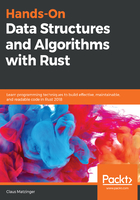
Summary
cargo is Rust's package manager and build tool that is configurable with a manifest called Cargo.toml. The file is used by cargo to build the desired binary with the specified dependencies, profiles, workspaces, and package metadata. During this process, the package state is saved in a file called Cargo.lock. Thanks to its LLVM frontend, Rust compiles to native code on various platforms including the web (using Wasm)—thus keeping a high degree of interoperabilty. Successfully-built packages can be published on a repository called crates.io, a website that is a central hub for available Rust libraries and binaries.
Before we dive into data structures (starting with lists), the next chapter will introduce the ways Rust stores variables and data in memory, whether to copy or to clone, and what sized and unsized types are.